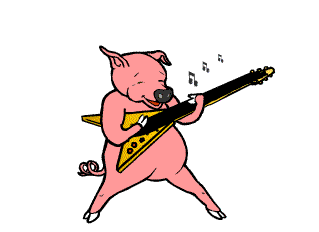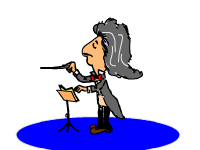yo soy músico
Here comes part three of my reflections on the units I’m currently using in KS2 Spanish. If you’ve read the other parts on Units 5 and 11, you’ll recall that I’ve taught the units to half of the school and am now teaching the parallel classes until the summer break. So the current groups are probably getting a better deal as I refine and adapt from the first run, but may not finish the unit in its entirety as the end of term leads to much lesson disruption!
As with Units 5 and 11, Unit 14 has an opening stimulus from which the unit stems. In this case, a song. Based on the well known children’s song, I am the Music Man, Yo soy músico has proved popular with Year 5. The QCA Unit which can be downloaded from here in PDF and RTF, gives the lyrics – you just have to sing it! Helen Myers has recorded a music only version – clever lady!- which can be found here, and if you want to hear how it sounds with a class in full voice, check out the WCPS Spanish podcast in the right hand column – although I’m sure you’ve all subscribed to it in iTunes ;o)
At the top of the post is the Powerpoint I made to go with the song. Note that it has two parts. The first half is in the first person singular – Yo soy músico, which is the version used in the first instance when the teacher (or volunteer class member!) is the Music Man. The second part is in the first person plural – Somos músicos – as the class join in with the whole song and we all become Music Men. I used animations having listened to Nick Mair talking in Oxford about boys learning best when there is action and movement in the graphics. There is an initial disadvantage as the class comment on the guitar playing pig etc mid-song, but after the first view, this stops and it really helps memorisation.
Scheme of work for Year5 spanish summer yo soy musico
Looking at the medium term plan above, you can see that the objectives for the first lesson are to express simple opinions about music. This proved popular as we listened to some different types of music and decided if we liked them or not. In a previous unit on free time we had learned the phrase la música pop / rock / clásica and most recalled the phrase – and the accompanying action –
- la música – hands on ears like you’re listening to music then ..
- …pop – makes your hands pop from fists to spread fingers whilst making your eyes wide
- …rock – rock from side to side
- …clásica – conduct an orchestra
- …heavy – mosh!! (a clear favourite I must say!)
We added jazz (jazz hands) and folclórica (play a guitar) which took some explaining as few knew what it was! Several pupils commented on the use of cognates – and when one asked what tecno music would be, another piped up that ‘it’d be la música tecno, silly’
I expressed an opinion in Spanish about the music using facial expression then encouraged the class to offer their own opinion in Spanish. Again, the phrase was not unfamiliar but, for some, had to be dragged from memory banks!
We then sang the song which soon involved the whole class. The first couple of times, everyone sang all the instruments to learn and fix the words – and of course we did actions for those who are kinaesthetic learners (and to keep everyone awake!). Having looked at pronunciation of the words we had a quick look at accents – why do música / sax ofón / batería have accents – I explained it using people’s names – when we see a name in English we know (usually!) how to say it as there are stress patterns – it’s AlexANder not AlEXander and accents help show us how to say words. Pupils completed a simple sheet to finish the lesson – labelling and also trying to use their LLS to work out what six instruments were in English. Some of the words were obvious and others needed a bit of thought – but a few did work out los platillos are cymbals by thinking of plates!
ofón / batería have accents – I explained it using people’s names – when we see a name in English we know (usually!) how to say it as there are stress patterns – it’s AlexANder not AlEXander and accents help show us how to say words. Pupils completed a simple sheet to finish the lesson – labelling and also trying to use their LLS to work out what six instruments were in English. Some of the words were obvious and others needed a bit of thought – but a few did work out los platillos are cymbals by thinking of plates!
instruments lesson 1 – Get more College Essays
Next lesson began with a recap of vocabulary and game of Simóm dice. Then we sang the song, firstly using Soy músico but with each table alloted the flashcard of a musical instrument to represent. This led to hilarity as the ‘piano’ table worked out that they had to stand up and sit down every verse – as you can guess I chose this table carefully!! We looked at the words of the opening to the song and used Sé tocar… and then Toco ….. to say which instruments we could and couldn’t play – an ‘on the ball’ pupil suggested ‘toco regular el piano’ and ‘no toco la guitarra muy bien’ as answers – not bad eh? It’s really encouraging when pupils ‘play around’ with language because they’re trying to express themselves more accurately.
We then looked at the second half – Somos músicos, venimos de Madrid etc’ and discussed how this might differ in meaning from the first half.
We went on to recap our opinions about music genres and this time tried to add some simple reasons for the opinion – because it’s slow, because it’s boring, because it has rhythm etc. Pupils made up sentences in groups adding all the bits from the two lessons to see how long a sentence they could make using connectives such as ‘y’ and ‘porque’.
types of music flashcards
At the start of the next lesson we recapped our opinions and started to present them in written form on graffiti wall posters – the word ‘graffiti’ made eyes sparkle although it was somewhat controlled graffiti! Whilst the class worked on this, I worked in the corner with my laptop and and microphone to record members of the class expressing their opinions about music – this was the start of WCPS Spanish podcast. The look of wonder on pupils’ faces when they heard their voice comin gout of my laptop and then the IWB was great – one lad, Zach, commented ‘But I sound really Spanish!’. (Pictures of posters to follow!)
Next we listened to some Spanish music and Latin American music, comparing and contrasting the instruments heard. I borrowed a CD from the library that had a vast array of South American music types on it, and I took in some of my own music – Tomatito, Heroes del Silencio, Joan Manuel Serrat, Los Nikis, Gloria Estefan, Alejandro Sanz, Operación Triunfo. We listened and decided which instruments we heard, and gave opinions on the singers / groups.
Then I role played buying a CD – using a ActivPrimary flipchart (in Box of Goodies as can’t upload to .DocStoc). In pairs with one as customer and one as assistant, the customer had to
- say they wanted to buy a CD
- express their opinion about a type of music and say which type they prefer
- agree to buy an item., and we recorded some examples (see podcast!)
The roles were swapped so that everyone got to play each character. We recorded some examples for the WCPS Spanish podcast as well. This time I’m going to add discussing buying an MP3 file to this bit ;o)

Having looked at accents and stress patterns as well as considering types of music, looking at the rhythm, especially the rhythm of words made perfect sense and we spent a good while clapping out phrases and trying to copy rhythms in the next session. At times it was rather haphazard, freestyle clapping but there were signs of promise from some who managed to copy accurately and understood the use of dynamics to mark stress. ‘Guess the phrase from the rhythm’ was a popular game – it’s amazing how much concentration it takes to clap a simple phrase!
The last few sessions were given over to Year 5 producing their own rap/song in Spanish. I allowed them free rein over this with the proviso that it had to be in Spanish (obvious to me but you’d be surprised!) As a whole class we discussed how the task might be tackled and we came up with a start for those who couldn’t think of a way in, then it was up to the groups to do their bit!
There were several things to note from these lessons for next time.
- Some groups needed more support than they were given – perhaps more time working together as a whole class before setting groups off on their own.
- Groupings are key, and all the ‘musical’ kids ended up in two groups – they would’ve been better perhaps split up to help those whose rhythm was a bit off!
- When recording pupils’ final productions, don’t put your iRiver anywhere near the drums! Sadly, a couple of good outcomes are drowned out by the percussion.
I’ll upload those that will not damage eardrums to the podcast and/or Box of Goodies as soon as this post is finished ;o)
There were a couple of groups that tried to sing their performances to tunes from The Sound of Music – good idea, I thought. Some stuck to opinions on music, others tried to work in vocabulary from other units such as Personal introduction vocabulary and sporting likes and dislikes.
The other Year 5 class are very different to the first group and I expect this half term to pan out differently to the previous one. I think this time we’ll look at the pre-performance interview suggested in the QCA Unit and perhaps try to adapt a song rather than write rap. I’ll keep you informed!
NOTE – if you’d like ideas on this Unit in french, check out Talkabout Primary MFL where Jo Rhys Jones has spookily just blogged about the same unit!









